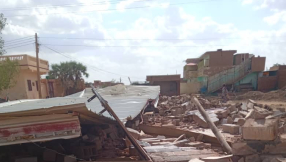Israel and Hamas agree to Gaza truce
"Both sides have pledged to halt all hostilities and all military activities against each other," Egyptian Foreign Ministry spokesman Hossam Zaki said in Cairo on Tuesday, after weeks of separate talks with Israel and Hamas.
Confirming details provided to Reuters by a Palestinian official in Gaza on Tuesday, Zaki said the truce would go into effect at 6 a.m. local time (4 a.m. British time) on Thursday.
A ceasefire would aim to end rocket and mortar bomb attacks on Israel from the Gaza Strip and Israeli raids in the territory. Israel has said it would continue preparing for possible large-scale military action should a truce fall apart.
Shortly before the Palestinian official said a six-month ceasefire had been reached, Israel launched air strikes that killed six militants in the Gaza Strip.
Israel stopped short of confirming the timing of what it said would be an informal arrangement to halt fighting. An Israeli official said Israeli intelligence chiefs were sceptical a truce could last.
Ismail Haniyeh, head of the Hamas government in the Gaza Strip, issued a statement welcoming Egypt's efforts "to achieve calm" and saying progress had been achieved towards halting Israeli "aggression and ending the siege".
Hamas officials said other Palestinian factions in the Gaza Strip had agreed to abide by the ceasefire.
BLOCKADE
Israeli and Palestinian officials said earlier that under any truce accord, the blockade Israel imposed on the Gaza Strip after Hamas seized the territory a year ago from Palestinian President Mahmoud Abbas's Fatah faction would be eased gradually and partially.
Israel has allowed in humanitarian aid but has cut back on the supply of non-essential goods, such as construction materials, as well as fuel, saying Gazans could not expect to lead normal lives while Israelis were under rocket attack.
"What is important is not words but actions," said Mark Regev, a spokesman for Israeli Prime Minister Ehud Olmert.
He repeated Israel's demands for an end to strikes on Israeli civilians, a halt to arms smuggling into the Gaza Strip and progress toward the release of Gilad Shalit, an Israeli soldier seized by Gaza militants two years ago.
Israel's Defence Ministry said one of its senior officials, Amos Gilad, would fly to Cairo later on Tuesday to be updated on the progress of the truce negotiations.
"If Hamas keeps the ceasefire, we can gradually deliver more goods and supplies," the Israeli official said.
He said any commitment to a level of supplies into the Gaza Strip would be kept "vague on purpose" and that the enclave's main crossing to the outside world, the Rafah terminal along the Egyptian frontier, would remain closed for now.
In pursuing a truce, Hamas has sought a reopening of crossings, including at Rafah. The Israeli official said Rafah could reopen only if there was "significant progress" on Shalit.
A Palestinian source familiar with the ceasefire negotiations said the Israeli-run Karni and Sufa crossings would step up operations three days after the truce takes effect, with the flow of goods set at 30 percent of the levels before Hamas took over the Gaza Strip.
Ten days after the truce begins, Israel would ease limitations at Karni and Sufa, the source added, although some restrictions on certain goods would remain in place.
The source said Hamas and Fatah would try to work out a deal on administering the Rafah crossing, talks that would be held in parallel with negotiations on a prisoner swap for Shalit.













